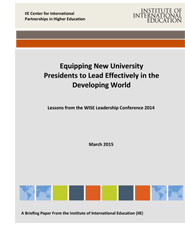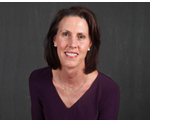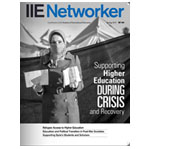
| IIE Home | Membership | Publications | Open Doors | Contact Us | Subscribe |
|
||||||||||
|
||||||||||
|
News
 This IIE briefing paper, prepared by Wilfred B. Brewer, President of Performance-Solutions-Group, Inc., and Mahboob Mahmood, Founder and CEO of Knowledge Platform, provides lessons from the 2014 WISE Leadership Conference in Doha, Qatar. The WISE Program for Education Leadership is part of the Qatar Foundation’s WISE initiative, which is an international, multi-sectoral platform for creative thinking, debate, and purposeful action in the field of education. This IIE briefing paper, prepared by Wilfred B. Brewer, President of Performance-Solutions-Group, Inc., and Mahboob Mahmood, Founder and CEO of Knowledge Platform, provides lessons from the 2014 WISE Leadership Conference in Doha, Qatar. The WISE Program for Education Leadership is part of the Qatar Foundation’s WISE initiative, which is an international, multi-sectoral platform for creative thinking, debate, and purposeful action in the field of education. Each year, a group of 10–20 new university leaders are selected to take part in the three-day program in Doha. The participants are guided through a rigorous program delivered by expert trainers from around the world, covering some university-specific topics and other more general leadership and management themes. Core to the training philosophy is the understanding that new university leaders have a unique opportunity to effect change at their home institutions, communities, and countries.
This briefing paper provides a compelling analysis of data collected from the most recent WISE Program for Education Leadership class. Brewer and Mahmood conclude with essential recommendations for new university leaders in any country.
 IIE Vice President Edith Cecil writes about a new initiative of the Higher Education Readiness (HER) program in Ethiopia, which seeks to engage the parents of the 100 newly selected HER high school girls through a series of parent meetings. "IIE applauds the HER parent’s participation and looks forward to an ongoing series of meetings focused on the importance of completing high school and looking towards university." IIE Vice President Edith Cecil writes about a new initiative of the Higher Education Readiness (HER) program in Ethiopia, which seeks to engage the parents of the 100 newly selected HER high school girls through a series of parent meetings. "IIE applauds the HER parent’s participation and looks forward to an ongoing series of meetings focused on the importance of completing high school and looking towards university."It has come to IIE’s attention that fraudulent LinkedIn and other website pages containing IIE employment postings are being used to induce individuals to contact a fraudulent email account (recruit[at]iie-usa[dot]org) or fax (206-337-6174). These web pages and advertisements may bear the name and logo of IIE and ask individuals to provide personal information, such as CVs/resumes, to the phony email or to a fax number. The fraudulent pages have copied actual IIE language from IIE’s website. IIE has learned that applicants who have responded to the fraudulent email address and/or fax number have received requests for additional personally identifying information and/or a "confirmation" that they have been offered a job.
IIE does not own, use or endorse the recruit[at]iie-usa[dot]org email address and does not accept job applications by fax. We believe that activity using this false email address and fax number is phishing—an illegal attempt to obtain personal information from people for identity theft or other criminal purposes.
We strongly advise that you not contact or respond to any request for information from the recruit[at]iie-usa[dot]org address or the 206-337-6174 fax number. Before applying to IIE or any potential employer, individuals should protect themselves by first verifying that the email address, application website or other contact information is legitimately that of the prospective employer. IIE’s job postings and application information are available on our Careers at IIE page on IIE.org. If you have any questions regarding the legitimacy of any posting associated with IIE, please contact IIE at the email address on the Careers at IIE web page. If you receive any communication regarding employment at IIE that you would like confirm, please forward the complete message to the email address on the Careers at IIE page.
Morgan State in Baltimore, MD, has increased the number of international students on its campus by 64 percent since 2007, in part as a result of the White House’s HBCU-Brazil Alliance, which gives Brazilian students the chance to study at some of America’s oldest historically black colleges. —The Chronicle of Higher Education
American Students Head to Germany for Free College
A piece in Public Radio International’s Marketplace features American students pursuing degrees in Germany "where taxpayers pick up the tab,"—an international degree that is becoming increasingly marketable. —PRI
"The success of any institution venturing into the Cuba field will depend on having realistic expectations of what can be accomplished, familiarity with a fairly unique context for international academic relations, and an ability to overcome frustrations and obstacles," Writes CUNY Professor Lisandro Pérez. —The Chronicle of Higher Education
Conferences
April 10–11, 2015, Washington, DC | Read More
The 2015 Conference on Diversity in International Affairs will bring together 250 professionals and students from diverse backgrounds for seminars on foreign policy, professional development, global skills-building, international career opportunities, networking and mentoring. Participants will leave more aware of the skills required and the career and academic opportunities available to enhance their preparedness for leadership in an increasingly diverse and global workforce. The conference is a collaborative effort by the Council on Foreign Relations, Global Access Pipeline, & International Career Advancement Program.
ACE's Center for Internationalization and Global Engagement invites to you join an interactive discussion of international joint and dual degree programs. Framed by data from ACE's recent report, ‘Mapping International Joint and Dual Degrees: U.S. Program Profiles and Perspectives," this webinar will explore strategic planning, program administration and management, and the academic dimensions of international joint and dual degrees.
Study Abroad
 Early Registration Deadline: Early Registration Deadline:
May 1, 2015 | Register Today!
On October 1-2, 2015, the inaugural IIE Summit will bring together Generation Study Abroad commitment partners in Washington, DC, to highlight their progress and create positive new solutions.
Meet partners from across sectors and around the world and hear about Commitments that work. During featured high-level plenary debates, action-oriented sessions, think tanks, and networking opportunities, as well as an engaging expo hall, the Summit will mobilize Commitments and inspire new actions. Professionals from all sectors and all areas are encouraged to attend, with the goal of promoting dialogue beyond the traditional study abroad community. The Embassies of Brazil, New Zealand, Norway, and the United Kingdom will host networking receptions for conference participants.
A Sneak Peak at Summit Session Topics:
The IIE Summit on Generation Study Abroad will highlight best practices, ideas, and innovations that advance the collective Generation Study Abroad goal of significantly expanding and scaling education abroad.
Join plenary debates, panel sessions, and think tanks on subjects including:
The U.S. Department of State will launch a study abroad branch that will "push for diversity among study abroad participants, promote non-traditional destinations and build partnerships with foreign governments" reported Sarah Custer in The PIE News. Last year, U.S. study abroad grew by just 2 percent. "It will take 35 years to double numbers and that’s unacceptable," said Assistant Secretary of State for Educational and Cultural Affairs Evan Ryan at the Forum on Education Abroad last week.
Scholar Rescue Fund
 Alexa Schmidt’s article in the newly released IIENetworker magazine gives an overview of the higher education needs of refugee youth and gives specific recommendations on how universities can help to provide educational opportunities. "Universities worldwide have a key role to play in both facilitating access for refugees and contributing to the data and research to inform policy," writes Schmidt. Alexa Schmidt’s article in the newly released IIENetworker magazine gives an overview of the higher education needs of refugee youth and gives specific recommendations on how universities can help to provide educational opportunities. "Universities worldwide have a key role to play in both facilitating access for refugees and contributing to the data and research to inform policy," writes Schmidt.
|
| www.iie.org/iienetwork • Member website of the Institute of International Education © 2025 Institute of International Education. All rights reserved. |


